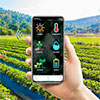| May 27, 2022 |
|
|
|
(Nanowerk News) Wide-ranging use of smart technologies is raising global agricultural production but international researchers warn this digital-age phenomenon could reap a crop of another kind – cybersecurity attacks.
|
|
Complex IT and math modelling at King Abdulaziz University in Saudi Arabia, Aix-Marseille University, France and Flinders University in South Australia, has highlighted the risks in a new article in the open access journal Sensors (“Cyber-Security Threats and Side-Channel Attacks for Digital Agriculture”).
|
|
“Smart sensors and systems are used to monitor crops, plants, the environment, water, soil moisture, and diseases,” says lead author Professor Abel Alahmadi from King Abdulaziz University.
|
|
“The transformation to digital agriculture would improve the quality and quantity of food for the ever-increasing human population, which is forecast to reach 10.9 billion by 2100.”
|
|
This progress in production, genetic modification for drought-resistant crops, and other technologies is prone to cyber-attack – particularly if the ag-tech sector doesn’t take adequate precautions like other corporate or defence sectors, researchers warn.
|
|
Flinders University researcher Dr Saeed Rehman says the rise of internet connectivity and smart low-power devices has facilitated the shift of many labour-intensive food production jobs into the digital domain – including modern techniques for accurate irrigation, soil and crop monitoring using drone surveillance.
|
|
“However, we should not overlook security threats and vulnerabilities to digital agriculture, in particular possible side-channel attacks specific to ag-tech applications,” says Dr Rehman, an expert in cybersecurity and networking.
|
|
“Digital agriculture is not immune to cyber-attack, as seen by interference to a US watering system, a meatpacking firm, wool broker software and an Australian beverage company.”
|
|
“Extraction of cryptographic or sensitive information from the operation of physical hardware is termed side-channel attack,” adds Flinders co-author Professor David Glynn.
|
|
“These attacks could be easily carried out with physical access to devices, which the cybersecurity community has not explicitly investigated.”
|
|
The researchers recommend investment into precautions and awareness about the vulnerabilities of digital agriculture to cyber-attack, with an eye on the potential serious effects on the general population in terms of food supply, labour and flow-on costs.
|
